新版(人教版)七年级(下)英语Unit2课文详解
七年级下册英语第二单元讲解

七年级下册英语第二单元讲解Unit 2: My School Life。
Hello everyone! In this unit, we will explore the topic of "My School Life". We will learn about different subjects, school activities, and daily routines. Let's dive right in!Firstly, let's talk about subjects. In junior high school, students study a wide range of subjects. Some common subjects include English, Math, Science, Chinese, History, Geography, and Physical Education. English is an important subject as it helps us communicate with people from different countries. Math helps us develop logical thinking and problem-solving skills. Science teaches us about the natural world and how things work. Chinese is our mother tongue and it is important for us to learn and appreciate our own culture. History and Geography help us understand the past and the world around us. Physical Education keeps us fit and healthy.Apart from subjects, school life also involves various activities. One of the most exciting activities is the school sports meet. Students participate in different sports events such as running, long jump, high jump, and relay races. It is a great opportunity for students to showcase their talents and teamwork. Another important activity is the school concert. Students practice singing and dancing for weeks to put up a fantastic performance. It is a wonderful chance for students to display their creativity and confidence. Moreover, there are also school trips where students visit interesting places and learn outside the classroom. These activities enhance students' social skills, teamwork, and creativity.Now, let's move on to daily routines. Every student has a daily routine that includes attending classes, completing homework, and participating in extracurricular activities. A typical school day starts with morning assembly, where students gather to sing the national anthem and listen to important announcements. Then, students attend different classes according to their timetables. During breaks, students have time to relax, chat with friends, and have a quick snack. After school, students usually have extracurricularactivities such as sports practice, music lessons, or club meetings. Finally, students go home, have dinner, and complete their homework before going to bed.In addition to academic and extracurricular activities, students also face challenges and opportunities for personal growth. One common challenge is exams. Exams can be stressful, but they also motivate students to study hard and improve their knowledge and skills. Another challenge is making friends and building relationships. School is a place where students meet new people from different backgrounds. It is important to be friendly, respectful, and inclusive to create a positive and supportive learning environment. Moreover, students also have opportunities to develop leadership skills by taking on responsibilities such as class monitors or club leaders.To sum up, junior high school is a crucial stage in our education journey. It is a time of learning, growth, and exploration. We study various subjects, participate in exciting activities, follow daily routines, face challenges, and seize opportunities for personal development. Let's make the most of our school life and create wonderful memories that will last a lifetime.Thank you for reading and I hope you found this unit on "My School Life" informative and interesting. Good luck with your studies!。
(完整版)人教版七年级英语下册unit2讲解内容(可编辑修改word版)
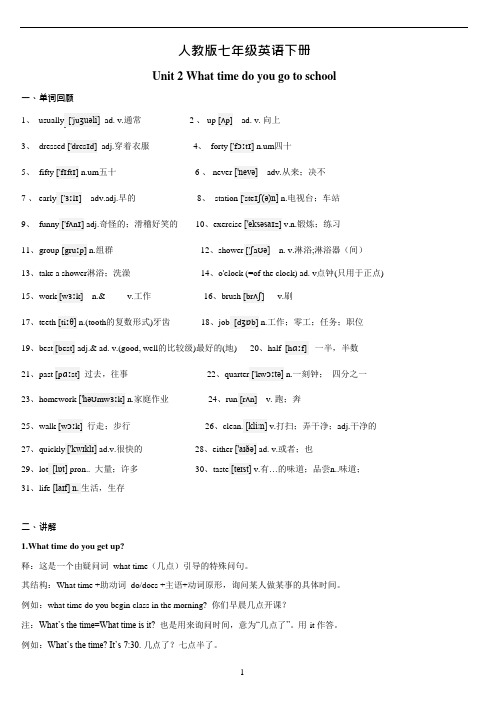
人教版七年级英语下册Unit 2 What time do you go to school一、单词回顾1、ad. v.通常 2 、up [ʌp] ad. v. 向上3、dressed ['dresɪd] adj.穿着衣服4、forty ['fɔːtɪ] n.um四十5、fifty ['fɪftɪ] n.um五十 6 、never ['nevə]adv.从来;决不7 、early ['ɜːlɪ] adv.adj.早的8、station ['steɪʃ(ə)n] n.电视台;车站9、funny ['fʌnɪ] adj.奇怪的;滑稽好笑的10、exercise ['eksəsaɪz] v.n.锻炼;练习11、group [gruːp] n.组群12、shower ['ʃaʊə]n. v.淋浴;淋浴器(间)13、take a shower淋浴;洗澡14、o'clock (=of the clock) ad. v点钟(只用于正点) 15、work [wɜːk] n.& v.工作16、brush [brʌʃ] v.刷17、teeth [tiːθ] n.(tooth的复数形式)牙齿18、job [dʒɒb] n.工作;零工;任务;职位19、的比较级)最好的(地) 20、half [hɑːf] 一半,半数21、past [pɑːst] 过去,往事22、quarter ['kwɔːtə] n.一刻钟;四分之一23、homework ['həʊmwɜːk] n.家庭作业24、run [rʌn] v. 跑;奔25、walk [wɔːk] 行走;步行26、打扫;弄干净;adj.干净的27、quickly ['kwɪklɪ] ad.v.很快的28、either ['aɪðə] ad. v.或者;也29、lot [lɒt] pron.. 大量;许多30、taste [teɪst] v.有…的味道;品尝n..味道;31、life [laɪf] n. 生活,生存二、讲解1.What time do you get up?释:这是一个由疑问词what time(几点)引导的特殊问句。
七年级下册英语人教版u2课文
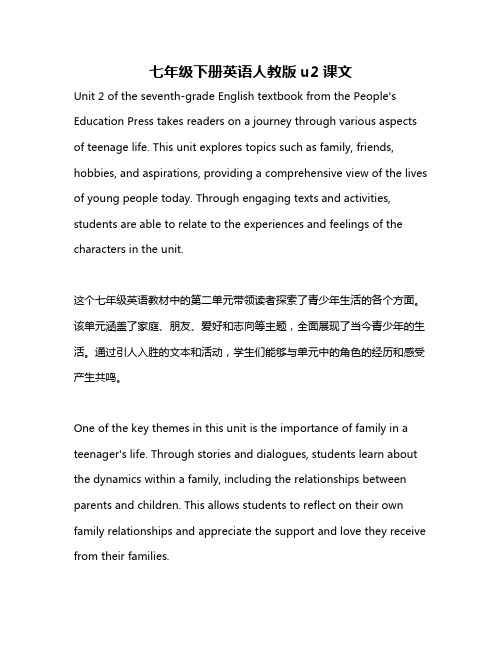
七年级下册英语人教版u2课文Unit 2 of the seventh-grade English textbook from the People's Education Press takes readers on a journey through various aspects of teenage life. This unit explores topics such as family, friends, hobbies, and aspirations, providing a comprehensive view of the lives of young people today. Through engaging texts and activities, students are able to relate to the experiences and feelings of the characters in the unit.这个七年级英语教材中的第二单元带领读者探索了青少年生活的各个方面。
该单元涵盖了家庭、朋友、爱好和志向等主题,全面展现了当今青少年的生活。
通过引人入胜的文本和活动,学生们能够与单元中的角色的经历和感受产生共鸣。
One of the key themes in this unit is the importance of family in a teenager's life. Through stories and dialogues, students learn about the dynamics within a family, including the relationships between parents and children. This allows students to reflect on their own family relationships and appreciate the support and love they receive from their families.该单元中的一个重要主题是家庭在青少年生活中的重要性。
(完整版)人教版初中英语七年级下册Unit2SectionB教材全解
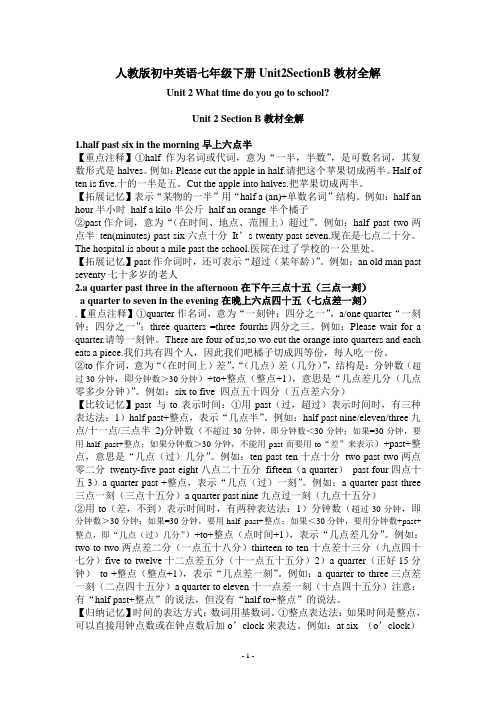
人教版初中英语七年级下册Unit2SectionB教材全解Unit 2 What time do you go to school?Unit 2 Section B教材全解1.half past six in the morning早上六点半【重点注释】①half作为名词或代词,意为“一半,半数”,是可数名词,其复数形式是halves。
例如:Please cut the apple in half.请把这个苹果切成两半。
Half of ten is five.十的一半是五。
Cut the apple into halves.把苹果切成两半。
【拓展记忆】表示“某物的一半”用“half a (an)+单数名词”结构。
例如:half an hour半小时half a kilo半公斤half an orange半个橘子②past作介词,意为“(在时间、地点、范围上)超过”。
例如:half past two两点半ten(minutes) past six六点十分It’s twenty past seven.现在是七点二十分。
The hospital is about a mile past the school.医院在过了学校的一公里处。
【拓展记忆】past作介词时,还可表示“超过(某年龄)”。
例如:an old man past seventy七十多岁的老人2.a quarter past three in the afternoon在下午三点十五(三点一刻)a quarter to seven in the evening在晚上六点四十五(七点差一刻).【重点注释】①quarter作名词,意为“一刻钟;四分之一”,a/one quarter“一刻钟;四分之一”;three quarters =three fourths四分之三。
例如:Please wait for a quarter.请等一刻钟。
There are four of us,so wo cut the orange into quarters and each eats a piece.我们共有四个人,因此我们吧橘子切成四等份,每人吃一份。
2022英语书七年级下册人教版第二单元2b课文翻译

2022英语书七年级下册人教版第二单元2b课文翻译2a 部分翻译Check(☑)the actMhes you think are healthy.选出(☑)你认为健康的活动。
go to bed early 早睡eat ice-cream 吃冰激凌eat quickly 吃得快eat vegetables 吃蔬菜play sports 做运动take a walk 散步22b 部分翻译Tony and Mary are brother and sister.They have healthy and unhealthy habits. Who is healtluer? Circle the healthy activihes.托尼和玛丽是兄妹。
他们有健康的和不健康的习惯。
谁更健康?圈出健康的活动。
Hi!I'm Tony.I don't like to get up early. In the morning,I get up at eight.Then I go to school at eight thirty.I don't have much time for breakfast,so I usually eat very quickly. For lunch,I usually eat hamburgers.Afier school,I sometimes play basketball for half an hour.When I get home,I always do my homework first.In the evening,I either watch TV or play computer games. At ten thirty,I brush my teeth and then I go to bed.你好!我是托尼。
我不喜欢早起床。
早上,我八点起床。
(完整)人教版初中英语七年级下册Unit2SectionA教材全解
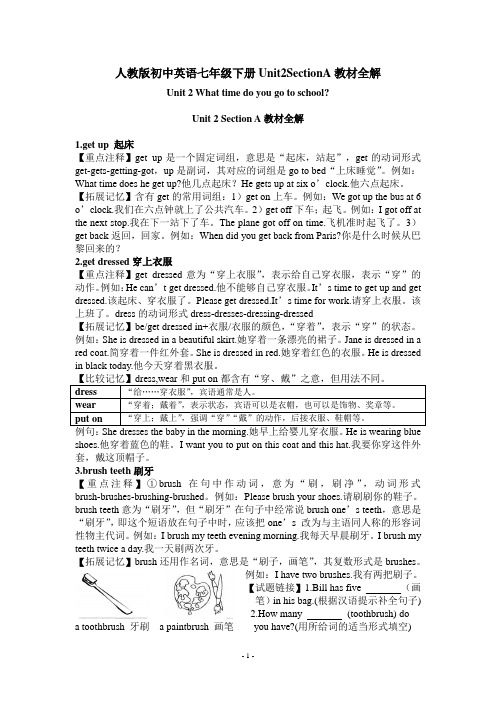
人教版初中英语七年级下册Unit2SectionA教材全解Unit 2 What time do you go to school?Unit 2 Section A教材全解1.get up 起床【重点注释】get up是一个固定词组,意思是“起床,站起”,get的动词形式get-gets-getting-got,up是副词,其对应的词组是go to bed“上床睡觉”。
例如:What time does he get up?他几点起床?He gets up at six o’clock.他六点起床。
【拓展记忆】含有get的常用词组:1)get on上车。
例如:We got up the bus at 6 o’clock.我们在六点钟就上了公共汽车。
2)get off下车;起飞。
例如:I got off at the next stop.我在下一站下了车。
The plane got off on time.飞机准时起飞了。
3)get back返回,回家。
例如:When did you get back from Paris?你是什么时候从巴黎回来的?2.get dressed穿上衣服【重点注释】get dressed意为“穿上衣服”,表示给自己穿衣服,表示“穿”的动作。
例如:He can’t get dressed.他不能够自己穿衣服。
It’s time to get up and get dressed.该起床、穿衣服了。
Please get dressed.It’s time for work.请穿上衣服。
该上班了。
dress的动词形式dress-dresses-dressing-dressed【拓展记忆】be/get dressed in+衣服/衣服的颜色,“穿着”,表示“穿”的状态。
例如:She is dressed in a beautiful skirt.她穿着一条漂亮的裙子。
Jane is dressed in a red coat.简穿着一件红外套。
新版(人教版)七年级(下)英语Unit2课文详解
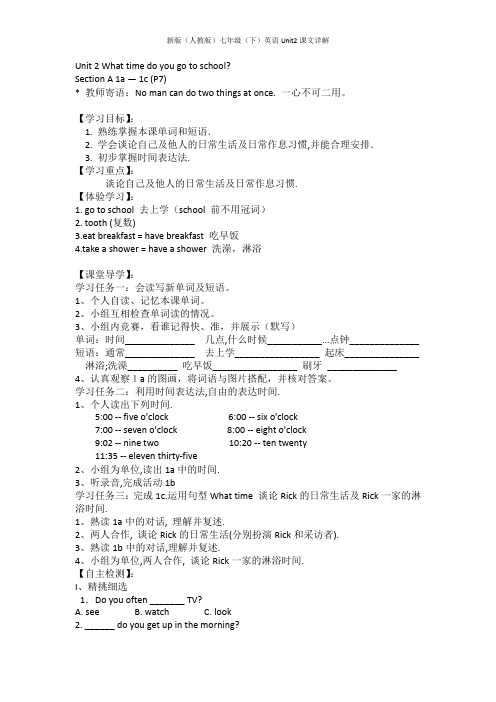
Unit 2 What time do you go to school?Section A 1a — 1c (P7)* 教师寄语:No man can do two things at once. 一心不可二用。
【学习目标】:1. 熟练掌握本课单词和短语.2. 学会谈论自己及他人的日常生活及日常作息习惯,并能合理安排.3. 初步掌握时间表达法.【学习重点】:谈论自己及他人的日常生活及日常作息习惯.【体验学习】:1. go to school 去上学(school 前不用冠词)2. tooth (复数)3.eat breakfast = have breakfast 吃早饭4.take a shower = have a shower 洗澡,淋浴【课堂导学】:学习任务一:会读写新单词及短语。
1、个人自读、记忆本课单词。
2、小组互相检查单词读的情况。
3、小组内竞赛,看谁记得快、准,并展示(默写)单词:时间______________ 几点,什么时候___________...点钟______________ 短语:通常______________ 去上学_________________ 起床_______________ 淋浴;洗澡__________ 吃早饭_________________ 刷牙______________4、认真观察1a的图画,将词语与图片搭配,并核对答案。
学习任务二:利用时间表达法,自由的表达时间.1、个人读出下列时间.5:00 -- five o'clock 6:00 -- six o'clock7:00 -- seven o'clock 8:00 -- eight o'clock9:02 -- nine two 10:20 -- ten twenty11:35 -- eleven thirty-five2、小组为单位,读出1a中的时间.3、听录音,完成活动1b学习任务三:完成1c.运用句型What time 谈论Rick的日常生活及Rick一家的淋浴时间.1、熟读1a中的对话, 理解并复述.2、两人合作, 谈论Rick的日常生活(分别扮演Rick和采访者).3、熟读1b中的对话,理解并复述.4、小组为单位,两人合作, 谈论Rick一家的淋浴时间.【自主检测】:I、精挑细选1.Do you often _______ TV?A. seeB. watchC. look2. ______ do you get up in the morning?A. WhereB. What timeC. How3. When ______ Tom take a shower?A. doesB. doC. has4. What time does Ann ______ every day?A. go schoolB. go to the schoolC. go to school5. -----What time is it ?------It’s ______ 7:00. We often have breakfast ____7:00A. at, atB. /, atC. at, /II、按要求改写句子.1. Alicia takes a shower at 9:00.(提问划线部分)______________________________________?2. Mary takes a shower at 8:00.(变一般疑问句)_________ Mary ________ a shower at 8:00?3. I usually go to bed at 10:00.(变否定句)I _______ usually _______to bed at 10:00.4. She often runs in the morning.(对划线部分提问)________ _________ she often _________?5.I usually get up at five o’clock every day. (对划线部分提问)________ _________ ________ you get up every day?Unit 2 What time do you go to school?Section A 2a— 2d(P8)* 教师寄语:No man can do two things at once. 一心不可二用。
人教版新目标英语七年级下册Unit2教材解读-新版

人教版新目标英语七年级下册Unit2教材解读-新版Unit2教材解读1.0Textbook Analysis教材解读本单元以“日常作息习惯(Daily routines)”为话题,围绕功能“Talk about routines, Ask about and say times”,谈论日常作息习惯,谈论自己和询问别人一天的作息以及作息时间,学习What time,When一般现在时态的问句和表示频率的副词。
Section A在内容上侧重让学生听Scott采访Rick和Jim兄妹谈论日常活动,并能简单谈论自己一天的活动。
侧重在话题牵引下的基本词汇储备和语法训练,重点学习小时加分钟的表达法,学习谈论时间的问句“What time...? When...?”。
Section B继续在话题牵引下对Section A在知识层面上的深化和拓展,介绍更为复杂的时间表达法(to和past);语言技能方面在进一步训练、发展听说技能的基础上,重点转向读写技能以及语言综合素养的培养和提升。
1.1Section A 1a 活动1a是一个基于话题的主要词汇和基本句型引入活动,通过主题图导入话题牵引下的核心词汇。
此部分以由旧到新的方式呈现:7上学过的词块是“go to school, eat breakfast”, 本单元新出现的词汇“get up, get dressed, brush teeth, take a shower”;所列日常活动以词块的形式整体出现,便于整体输出;还通过例句初步感知基本句型:“What time...? I ...at...”。
1.2Section A 1b-1c 活动1b-1c是Listening and speaking部分。
引导学生通过观察1a主题图的活动,引导学生观察理解日常活动和活动的时间,让学生感知谈论日常活动的基本句型和时间表达法,预测1b 中几个小对话中关于日常活动所匹配的时间。
- 1、下载文档前请自行甄别文档内容的完整性,平台不提供额外的编辑、内容补充、找答案等附加服务。
- 2、"仅部分预览"的文档,不可在线预览部分如存在完整性等问题,可反馈申请退款(可完整预览的文档不适用该条件!)。
- 3、如文档侵犯您的权益,请联系客服反馈,我们会尽快为您处理(人工客服工作时间:9:00-18:30)。
Unit 2 What time do you go to school?Section A 2a— 2d(P8)* 教师寄语:No man can do two things at once. 一心不可二用。
【学习目标】【学习重点】:1. 熟练掌握本课单词和短语.2. 学会谈论自己及他人的日常生活及日常作息习惯,并能合理安排.【体验学习】:用适当的词填空,补全下面的短文:My DayI usually _____ ____(起床)at 6:30. I have breakfast ______ (在) seven o’clock . After breakfast, I ______ ____ _____(洗澡)and then I ____ ___ ____(上学)at 7:30. I get to school at 7:40. I have five classes in the morning. And then I ______ _____ (吃午饭) at 12:00. In the afternoon, I have two classes. I ____ ______(回家)at 6:20. I get home at 6:30 p.m. I ______ _______(吃晚饭)at about 7:00. After dinner, I do my homework(做作业). I go to bed(睡觉)at 10:00. I am very busy(繁忙的)and happy every day.【课堂导学】:学习任务一:完成活动2a1.听录音,完成2a中的句子。
2.再听一遍录音,自己核实答案。
3.小组相互核对答案,检查所听结果。
4.小组为单位,谈论对话中的内容。
学习任务二:完成活动2b。
1.听录音,完成时间表。
2.再听一遍录音,自己核实答案。
3.小组相互核对答案,检查所听结果。
4.小组为单位,谈论2b中的内容。
eg. A:What time does Bob take a shower?B:She takes a shower at 5:30.学习任务三:完成2c部分。
1.以小组为单位, 编新对话。
2.小组竞赛,展示新对话。
学习任务四:完成2d部分。
1.要求学生边读对话边翻译。
2.学生质疑,师生共同解惑。
3.教师领读或听录音带跟读课文。
4. 学生大声朗读并背诵课文。
【自主检测】:I、精挑细选1. Scott has _____ interesting job.A. anB. aC. /2. -----What's the time? -----__________ nine fifteen.A. This isB. It'sC. At3. That’s a funny time ______ breakfast!A. forB. inC. onII、根据汉语完成英语句子。
我们从周一到周五上学。
We go to school ______ Monday _____ Friday.我穿好衣服后就吃饭。
After I ______ ________ , I have breakfast.她上课总是迟到。
She is always _______ _______ class.【快乐链接】英汉对对碰:Match each word with the right Chinese meaning.Unit 2 What time do you go to school?Section A Grammar Focus — 3c (P9)* 教师寄语:No man can do two things at once. 一心不可二用。
【学习目标】【学习重点】:1. 进一步掌握what time和when引导的疑问句2. 掌握usually, always never, on weekends 等词的用法。
【体验学习】:按要求写出下列单词的变换形式。
brush (第三人称单数) _________ good(最高级) __________2. what time 与when 的区别when与what time都可以用来询问时间,相当于汉语的“什么时候”,它们之间的异同点如下:1)询问做某事的具体时间(钟点)时两者可以互换如:你什么时候去上学?— When / What time do you go to school?—I go to school at seven o’clock.2) 询问钟表所显示的时间时,只能用what timee.g. —What time is it? (=What’s the time) 几点了? —It’s eight thirty.八点半。
3)询问事件发生的年份、月份、日期等非非钟点性时间时,只能用when, 而不能用what time。
e.g. —When is your birthday? —My birthday is February 6th.—When is Teachers’ Day?—It’s September 10th.[总结]: What time 几点了?准确到分,When 的范围比较大。
【课堂导学】:学习任务一:完成Grammar Focus1. 学生自学,并理解句子意思。
.2.分组朗读句子。
3.学生质疑,师生共同解惑。
(教师简介usually, always never的用法与区别)4. 小组活动,运用Grammar Focus的句子编写对话。
学习任务二:完成3a部分1.学生仿照例句完成其他练习。
2.小组相互核对答案。
3.分组朗读句子。
学习任务三:完成3b部分1.学生用所给的词完成句子。
2.小组展示成果学习任务四:完成3c部分小组活动并展示成果学习任务五:合作交流Group work: 讨论如何使用what time 及when 并各造2个句子。
____________________________________________________________________________________________________________________________________________________________________________________________________________________________________________________【自主检测】:I.翻译官1. 在周末2. 去上班_________3. 吃晚饭4. 在六点半II、根据汉语完成英语句子。
你爸爸通常几点钟去上班?______ ______ _____ your father usually go to work ?他总是说而不做。
He is _______ telling, ________ doing.他们通常在周末锻炼。
They usually exercise ______ _________.你最好的朋友几点上学?What time does your ______ ________ go to school?Ⅲ、连词成句goes, he ,work ,to ,at ,o’clock, ten ,always(.)___________________________________________________________get, dressed, do , they, time, what (?)____________________________________________________________when, exercise, your, do, friends (?). ____________________________________________________________ do, get, you, on, up, school, time, days, what (?)_____________________________________________________________Unit 2 What time do you go to school?Section B 1a — 1e (P10)* 教师寄语:Time works wonders. 时间能创造奇迹。
【学习目标】:1.熟练掌握本节课的单词及短语.2.能够利用所学句型询问及表述时间。
3.掌握时间表达法【学习重点】:学会谈论自己或别人的日常生活,询问及表述时间。
【体验学习】:1. 个人自读,找出并记忆新单词和短语.2. 翻译官在早晨____________ 在晚上____________ 在下午去睡觉__________ 做作业____________ 去散步六点半_____________ 六点一刻六点四十五__ 【课堂导学】:学习任务一:完成活动1a部分.1. 两人一组,练习对话。
----What time do you usually go to bed?-----I usually go to bed at 9:452. 学生质疑,师生共同解惑。
(介绍时间的表达方法)3 . 完成1a 将行为与时间匹配。
4. 在小组内核对答案。
学习任务二: 完成活动1b部分1.两人一组,练习对话。
-----When do students usually eat dinner?-----Students usually eat dinner at a quarter to seven in the evening .2.利用1a中的短语,做替换练习。
3.小组竞争,展示成果。
学习任务三: 完成1c,1d,1e部分1. 听录音,圈出你听到的活动。
2. 核对答案,完成1c,3. 再听一遍录音,完成1d,4. 记住这些表示日常活动的动词和动词词组.5. 听录音,复述所听内容6. 两人一组,练习所听材料。
完成1e------When does Tom usually get up ?-------He usually gets up at half past five.学习任务四:合作交流讨论时间的表达方法,并区分past与to的含义,试着翻译下列时间4:15 ______________ 4:30 ________________ 4:45 __________________总结时间的表达法: 第一种方法:顺读法先说点钟数,再说分钟数第二中方法:倒读法分钟+past / to +点钟数⑴分钟数不超过30分钟,中间用“past”连接,意为“过”,e.g. 8:29 twenty—nine past eight八点过29分⑵分钟数超过30分钟,中间用“to”连接,意为“差---分到几点”e.g. 8:59 one to nine.可翻译为差一分到九点/九点差一分/8点59分⑶15分钟,表示为 a quarter eg: 9:15 -- a quarter past nine⑷30分钟,表示为half9:30 half past nine (30分钟只用past,不用to)注意:整点钟的表示方法只有一种,即钟点数+ o’clock eg: 8:00 -- eight o’clock 【自主检测】:I、精挑细选1. What time does Linda _______ after school?A. do her homeworkB. does her homeworkC. do her homeworks2. They often have lunch _______ 12:00.A. inB. atC. on3.When do you ________ every day?A. go to homeB. go homeC. go a homeII、连词成句1.go,mother,to, usually,at,eleven, bed,my___________________________________________.2.usually, go, he, to, when, work, do___________________________________________?3.plays,after,guitar,I,often,the,dinner___________________________________________.4.do,lunch,time,she,what, have___________________________________________?5.usually, people, does, breakfast, eat, when___________________________________________?Unit 2 What time do you go to school?Section B 2a — 2c (P11)* 教师寄语:Time works wonders. 时间能创造奇迹。
